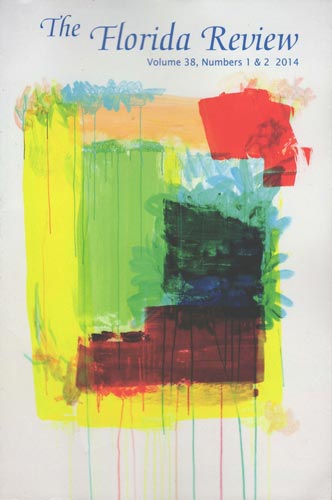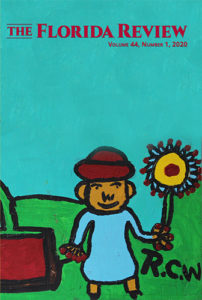The Florida Review – 2014
This double issue of The Florida Review packs in a dazzling array of thought-provoking reading. It invites with accessible forms and quotidian subjects, and rewards with more challenging and experimental material. It covers a vast range of the human experience: what is it like, and what does it mean, to be a woman, a Mormon, a Jew, a person aware of the nearness of death, a person pondering her relationship to her vocation? This double issue of The Florida Review packs in a dazzling array of thought-provoking reading. It invites with accessible forms and quotidian subjects, and rewards with more challenging and experimental material. It covers a vast range of the human experience: what is it like, and what does it mean, to be a woman, a Mormon, a Jew, a person aware of the nearness of death, a person pondering her relationship to her vocation? As Jocelyn Bartkevicius put it in her editor’s note, many of the pieces in the issue seem to involve the writer as a witness. To me, this comes through as an almost political undercurrent, an awareness that the writer is connected to her surroundings and those around her, despite the solitary nature and image of the writer’s life.
Freya Gibbon and Marcia Aldrich’s pair of essays dwell on their responsibilities as writers to themselves and the world. In “Enough,” Aldrich recounts a female friend’s anxiety over the confirmation of the unmarried and childless Elena Kagan as a Supreme Court justice: could it have been different for her, who married and had children? Aldrich then turns to her own life: “It doesn’t make me feel better when I itemize the differences in circumstances between Virginia Woolf and me. There is that small matter of unfathomable greatness, hers, not mine.” Who among us has not done the same thing?
Gibbon’s points of reference were Thoreau and Marcus Halevi, whose photographer’s instincts led him to point his camera at a drowning woman instead of rescuing her. “It’s not about Walden,” Gibbon writes. “It’s about doing work in the backseat when you should have been involved in the conversation up front.” This is not the beginning of a sermon to the reader, but a slow reproach to herself as she tells the story of a gifted child whom she once babysat and whose parents seemed determined to remake by force. At the end Gibbons says, “I have not documented social unrest. . . I have not altered Toby’s life by writing this essay. Why do I write this essay now?” The question remains unanswered; and indeed, each writer must come up with his or her own answer.
Can one be content as “a lesser poet,” then, as in John Blair’s poem of that title? Most poets are lesser poets, and they know it. The poem eyes the situation with humor (or bitterness, depending on how you read it): the lesser poet is “a patron saint of not / a bloody thing” and “marooned in a / wasted life in which you / never died too young.” In a second poem, “And Yet It Moves,” thwarted ambition makes better peace with itself:
Galileo homeward
went, to cows and cats
and utter blindness
[. . .]
cats fish-fat sleepy
in his lap, while the darknesss
pins its lovely lies.
There is more humility in it, but also resignation to the closing-in of age and death whether one succeeds or fails in this life.
The passing of time is also front and center in Patricia Foster’s “About Last Night,” Jay Bates’s “What the Soup Reveals,” and Floyd Skloot’s poems. They tell stories about illness, aging, and death, but also perseverance and the chance for renewal in the face of the inevitable. Foster’s husband keeps on protecting her from the small terrors of daily life when he is seriously ill; the widower in Bates’s story vexes himself like a young man over a beautiful widow in town; and Skloot in “Turning Sixty-Five” sees cracks in the quiet world around him:
When my wife coasts into the slow curve that takes
us west and slopes gently down to the heart
of the city, I follow, reading in her graceful
swerve the danger of wind-blown sand
mounded at the margin of the path.
The lyricism in Jacob Newberry’s poems is made breathless and immediate by the lovely line breaks and spacing; the speakers of “Hanging Clothes on the Roof in Jerusalem” sound as if they were remembering as they speak, poets and storytellers around a fire in the desert:
I was alone
that night. I was hanging my clothes to dry
and the singing had ended.
I was hanging my heart to dry
and the singing had ended.
There is much more that is gripping and beautiful in this issue of The Florida Review, including comics by Robert Hendricks, a conversation with the poet Ed Ochester, and of course Chris Robb’s cover. I found much pleasure in it, and I hope you will also.



